“Deckard is not a bloody replicant!” Blade Runner 1982 – a defence
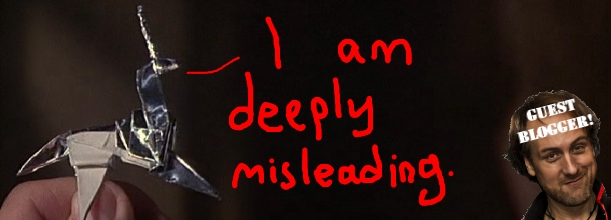
I, unlike the vast majority of the human race, actually saw Blade Runner in the cinema on its initial release in late 1982. It BLEW. MY. MIND. I blagged my way into the Classic Cinema on Allerton Road, Liverpool, being, aged twelve, two years too young to see the film legally (It was a AA certificate, remember those?), then came reeling out, my young brain fizzing with wonder and adrenaline. I spent the next four years wondering if I’d actually seen the film or just imagined it – it’s so sensual and immersive that on seeing it for the first time on a big screen it feels more like a dream you’re having than a movie you’re watching – and the fact that no-one else I knew had seen it didn’t help in this regard.
When I was sixteen it turned up on a late night double bill with the first Terminator movie to which I dragged all my mates; I was relieved to discover that the film actually was as good as I remembered and even more relieved that I finally had people to blether about it to with.
A few months later, in June 1986, the film made its UK television debut, on the eve of one of my trickier O level exams (yes, I’m that old). This unfortunate coincidence led to my parents finally getting us a VCR. Consequently, exams over, I now had a VCR and only one film to watch on it. I watched Blade Runner a LOT over the summer of 1986.
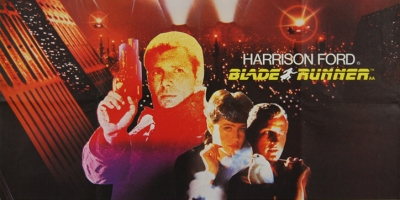
What I’m trying to say is that Blade Runner – THIS Blade Runner, the original – is by some margin my favourite film ever, and all the subsequent versions are, to me, like annoying unnecessary remixes of my favourite song. But worse than that, all of the changes, the ‘refinements’, actually take Blade Runner further away from what, to me at least, it’s actually about.
Blade Runner is about, in a word, humanity. What it is, what qualifies as it, how we can lose it and how we could get it back. OR, it’s a visually impressive if slightly sluggishly paced sci-fi thriller with an unbelievably lame twist at the end.
The idea that Deckard is a replicant – and the ham-fisted insertion of the unicorn ‘dream sequence’ to introduce this – takes all the thematic richness of the original film and trades it in for the weakest plot twist this side of Tim Burton’s Planet Of The Apes remake. Hey! He’s a replicant too! Ha! Didn’t see that coming, did you? No, because it MAKES NO SENSE.
For a start, it doesn’t work as a plot device. The idea, presumably, is that faced with the task of tracing and killing a gang of superhuman androids, the Powers That Be have created another android and programmed it to think it’s a human android-hunting cop, and set it off in search of the bad guys.
In which case, why have they made such a rubbish android?
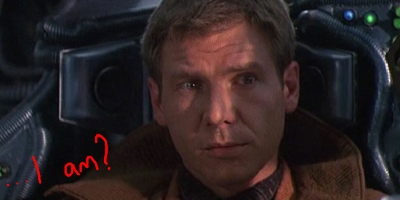
Why didn’t they build some sort of Chuck Norris one-man army martial arts expert android, and programmed its head with some sort of Death Wish-esque personal history – wife and kids murdered by replicants, that sort of thing – so that it would not only be capable of taking on the fugitive replicants but eager and willing to do so? Why did they build a slightly middle aged and out of condition android who is not only so reluctant to take on the the task he only agrees under threat of violence (and is wracked with guilt and doubt throughout the hunt) but isn’t even strong and fast enough to do the job he’s supposedly been created to do?
Think about it; in all his confrontations with the fugitive replicants, Deckard gets his ass comprehensively kicked before getting a lucky break. Zhora beats the crap out of him in her dressing room before they get discovered by her fellow strippers, whereupon she runs away and Deckard guns her down from behind, Leon beats the crap out of him by the dumpster until Rachel shoots HIM from behind, Pris beats the crap out of him before taking too long a run up and giving him time to reach his gun (the only fight Deckard actually ‘wins’) and finally Roy breaks his fingers and toys with him for ages before saving his life. If Deckard is an android-hunting android, he’s a fucking useless android-hunting android.
So plot-wise it’s an idiotic concept. But thematically it ruins the whole damn movie. Blade Runner, in its original form, is the story of a man, yes a MAN, who has had all his humanity beaten out of him by the grimness of life in the 21st century, and who learns to be human again through his encounters with machines who are desperate to be human themselves. At the start of the film Deckard is a hollow, bitter shell of a man, by the end of it he’s driving off into the sunset with his new girlfriend, caring not a jot that she’s basically a really advanced household appliance, because damn it life is precious and he’s gonna drink up as much of it as he can…
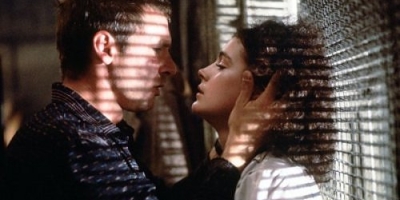
None of this counts for ANYTHING if he’s a replicant too.
Oh yes, and by the way, he drives off into the sunset. While I’m here, I may as well make my case in favour of the other ‘mistakes’ purged from the later cuts of the movie:
The Voice Over
Okay, I’ll admit that a few of the lines clunk like a dustbin falling down stone steps, but a couple of things redeem the voice-over. First of all, I’m not convinced that anyone would have been able to follow the plot of the 1992 and 2007 cuts if this previous, ‘annotated’ version hadn’t existed. It’s so murky and elliptical (and half the dialogue’s in a made up language) that if the ’92 and ’07 versions were the only ones anyone had ever seen, I’m not sure people would have known what was going on for the first twenty minutes at least. It’s easy to dismiss the VO as superfluous now we’ve all had the benefit of it – and stylistically, the VO works. Blade Runner is a sci-fi film noir; it’s a 1940s gumshoe picture transplanted into the future, as evinced by Deckard’s shabby raincoat and Sean Young’s wartime hairdo… The cod-Philip Marlowe voice-over fits right in with this, and yes Harrison Ford sounds incredibly bored and grumpy, but Deckard IS bored and grumpy. It works.
Besides, if you know the 1982 cut as well as I do you just dub it back in inside your head when you’re watching the later versions. Altogether now: “They don’t advertise for killers in a newspaper…”
The Happy Ending
This seems to be everybody’s least favourite bit of the 1982 cut, for a number of reasons. First of all because it’s the bit of the movie that isn’t dark. Sci-fi fans like dark. They like to go on and on about how The Empire Strikes Back is the best Star Wars film ‘cos it’s the DARKEST, how the new Battlestar Galactica is so much better than the 70s one because it’s all so much DARKER, how Babylon 5 was nothing like Star Trek, you fool, it’s so much DARKER than Trek. The fact that what is both thematically and literally one of the darkest movies ever made originally ended with rolling hills and glorious sunshine made a lot of us feel a bit odd. Blue skies? Countryside? What is this, a GIRLS’ film?
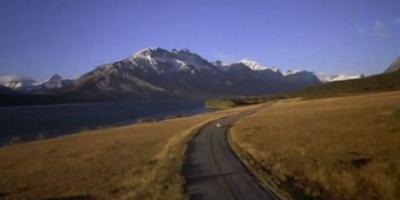
To go back to my theory of What Blade Runner Is About… For the last fifteen minutes or so of the film, if you look, the sun is coming up. It’s rising behind Roy during his “Time to die” speech; as Gaff arrives on the rooftop it’s bathed in a pale blue dawn light; sunlight is streaming through the venetian blinds in Deckard’s apartment when he finds Rachel asleep… The whole film has been plunged in stygian gloom and now, as Deckard re-discovers his own humanity, the sun is coming up (that’s why my least favourite revision of the 2007 cut is the excision of the patch of blue sky the dove flies away into). As such, it’s perfect that the re-humanised Deckard flees the city and drives away into nature.
Some people have of course claimed that it’s ludicrous that everyone would be living in a vast stinking megapolis if the outside world were still pristine and beautiful. To which I reply: LOOK AROUND YOU. The vast majority of us already live in vast stinking megapoleis and the countryside is very much still there. The idea of a post-apocaplyptic humanity crowded into The Last City On Earth is such a popular sci-fi meme (it just turned up again in Dredd, which is aces by the way) that it’s easy to assume that this is what’s going on in Blade Runner, but it’s not, and nowhere in any of the versions does it say it is. There doesn’t need to have been a World War Three for urban life to be a bit shit. Have you been to Middlesbrough?
Of course, if you’re going to decide that Deckard is a replicant, as ‘proven’ by the silly bloody unicorn ‘dream sequence’ (which, incidentally, doesn’t even look like a dream sequence, just a few frames of Legend clumsily faded in and out for no apparent reason) then none of this matters because the film isn’t actually about anything anyway. And by the way; the origami unicorn doesn’t need the addition of the dream sequence to work as a story element; we’ve established that Gaff leaves little sculptures about the place; him leaving one at Deckard’s apartment is his way of telling him that if he’s figured out that Deckard is sheltering Rachel it won’t be long before someone else does too. It’s a message; the message is “run”, and Deckard runs. The fact that the sculpture is a unicorn needn’t be of any specific significance.
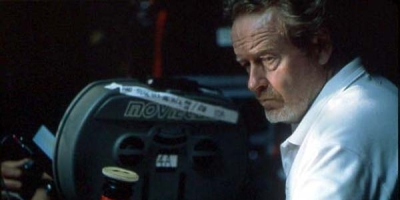
But… but… Surely (to return to the main thrust of the symposium) Deckard HAS to be a replicant because Ridley Scott said he is, didn’t he? That’s why he put the unicorn dream in! It’s Ridley’s film, it’s up to him, right…?
Here’s the thing about Ridley Scott; he is at once perhaps the greatest and most maddening filmmaker in the history of the craft. Nothing encapsulates this dichotomy like Blade Runner.
It never ceases to baffle me that while George Lucas is hauled over the metaphoricals for his constant tinkering with the original Star Wars trilogy, and Spielberg gets called all sorts of rude names for retroactively disarming the ET roadblock cops, Scott’s endless fiddling with a movie that was near as dammit perfect in the first place is lauded as purification, fine tuning, a necessary purging of errors and superfluities because this is RIDLEY FUCKING SCOTT we’re talking about here, and he’s an artist, a visionary, not a talentless hack like, er, Steven… Spiel…berg…
Now don’t get me wrong, Ridley Scott IS a visionary, and an artist, and all points in between; again, nothing sums this up like Blade Runner‘s influence on every dystopian sci-fi flick made these last thirty years (has there BEEN a Nightmare Vision Of The Future that didn’t rip it off to some extent?). And he’s had a shit month so I hope he doesn’t read this, at least not for a while. But his genius lies in very specific areas. Mark Kermode summed this up a few years ago; he said (and I’m paraphrasing) that Ridley is NOT a story-teller; he leaves that to the screenwriters and actors. What Ridley does – and he does this better than possibly any other director ever – is build the world that the story happens in.
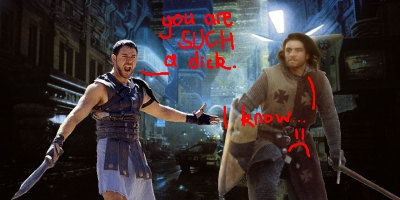
Case in point: Gladiator vs. Kingdom of Heaven. Both have the visual density, the vivid sense of time & place and the reach-out-and-grab-handfuls-of-screen immersive ambience that Ridley has made his trademarks, but while Gladiator has a tight linear plot, a script full of quotations-in-waiting (“My name is Maximus Decimus Meridius…”) and a career-defining performance from Russell Crowe, Kingdom of Heaven has a meandering plot, precisely NO memorable lines and Orlando (creeeak) Bloom wandering about looking confused in chainmail.
If you’re wondering what the point of all this is, I can’t say I blame you, but it’s this – Ridley Scott should not be considered the definitive and unchallengeable authority on what his movies are actually ABOUT. How they look, how they FEEL, yes, but the themes? The subtext? Not Ridley’s department. This is true of all artists, incidentally – once your work’s out there you no longer have any say over what it means. It just happens to be especially true of Ridley Scott.
Of course, you, like Ridley, are at liberty to disregard all of this and prefer whichever cut you, erm, prefer. I’ll always love the one that fried my twelve-year old brain. The one with the terrible Joanna Cassidy stunt double. The one where you can see the wires when the spinner takes off. The one where Harrison Ford’s lips don’t even remotely match his dialogue when he confronts the snake maker. The one with the voice over and the happy ending.
The one that’s actually about stuff.
This glorious guest blog comes courtesy of (and copyright by, obviously) Mitch Benn, who can be consumed in media ranging from Twitter to Amazon via real bloody life at his brilliant monthly comedy/music night Distraction Club. He’s ace.





Why didn’t Mitch point out the brightest of glaring obvious points to him *not* being a replicant?
…the fact he’s a dirty raper of robot ladies.
Thats right! I said it. Deckard is a dirty robot raping deviant. Don’t believe me…watch it again. Creepy.
Oh wow, I’ve only watched this recently and it was the 2007 one. I remember thinking throughout “This needs a voice over” to complete that 40’s noir thing they’re going for. Had no idea the original was so different! I’m gonna watch it next.
The 2007 cut doesn’t make Dekkard a replicant – it introduces more uncertainty (to both Dekkard and the audience) around a plot point that is already ingrained into the original cut. To read it as black and white as that in the 1982 version he’s human and in the later cut’s he is replicant is to miss the beutiful subtelty of it all – none of the versions answer the question, but they all have a slightly different balance.
Also I saw the ’92 version first and understood it just fine!
Great article. I love this film and love the passion it inspires amongst it’s many fans.
I agree with almost all of your blog, with the exception of the ending. The “happy” ending was forced on Scott by the studio because they didn’t like the film ending on the roof top with Roy’s death. And while there will be countryside outside of the city, I doubt it would have been so pristine. All the way through the film, advertising blimps are inviting rich people to escape the hell that Earth has become by going off-planet. Why do that if they could just build their own gated community somewhere near the mountains?
Great argument, and I agree that for many people who saw and love the original cut, the whole “Deckard is a Replicant” thing must seem largely like some hipstery cult that’s spawned from the later cuts, but if Deckard IS one, he’s some new advanced type of Nexus-7, like Rachel. That’s why he ain’t so tough… he’s more human 🙂
Why would the authorities use him? Maybe that makes him better at finding them, maybe it’s some sort of Nexus-7 field test, maybe they want to see if he’ll love/run away with Rachel, or one of many, many other possibilities (maybe some of the police don’t even know themselves?) Does Gaff know something Bryant doesn’t, or vice versa? Is Tyrell testing a new line of Replicant cops?
I absolutely agree that Deckard finding his humanity is the whole point of the film; the fact he is also himself a Replicant is a whole other layer on top of this.
I love everything about this film and all versions, and I love that it has lasted and the huge nerd augment about this that is continually uncovering tiny elements.
Whilst this would be a huge cop-out ending to write into original films, along with “he woke up and it was all a dream!”, if fits here, it works, and it’s done with beautiful ambiguity, meaning both arguments are correct. But for me, Deckard is a Replicant.
Ok, who poked the geeks? It is a well known fact that whenever 3 or more of the terminally un-girlfriended are gathered the was he/wasn’t he argument shall raise it’s head!
Deckard existed in the mind of PK Dick, which means the only person who can truly answer the question can only be contacted via a medium!
Be happy we have such a challenging and beautiful film to enjoy and ponder, knowing that this piece of cinematography, along with Alien, gave future directors and writers a distopian peg to hang their hat on.
But we all, deep down, know…Deckard was human!
I tried reading the article without picking up too much because… are you sitting comfortably? … I have never seen Blade Runner and I really want to!
So I asked Mitch for advice, and it turns out he’s actually written an entire article about it.
The real question of course is: Where does little me get hold of a 1982 original version, preferably in a decent transfer? Xactly. Apart from buying one of those oversized “everything ever published about this film plus 4 metric tonnes of stuff even hardcore freaks did not know they did not want” boxes, it seems that the 1982 release has been disowned by the studio and distributors.
So, *ahem* if anybody really loves Blade Runner, owns the super DVD box set but totally disagrees with Mitch to the point of not even wanting that particular disk in the house… put it on ebay, send me a tweet. I’ll buy it. Thanks!
hanry_m
Have to agree the he’s one of them has many holes as well, as pointed out so very well he’s very lacking in combat for one and was a very lousy Bladerunner at the end, where Roy was cheering him on to attack him! The Pris fight was pretty stupid, she could have easily snapped his neck when she had him between her thighs, still a remarkable film. First time I ever saw it was on tv from the Pris scene and a very strange man egging the hero on to fight him, then having one of the most moving deaths of all fictional media. ‘6, 7, go to hell or go to heaven!’ (I wonder if Tim Burton borrowed the 4-5, how to stay alive & 6-7…. as Catwoman says them, she also did a lot of flipping like Pris too)
I don’t hold Ridley in such great regard myself, I think James Cameron’s superior and his Terminator films (Forget the non Cameron ones, they never existed) are the definitive cyborg/android films of cinema, not Bladerunner but having said that do wish we saw the Offworlds, just as in Battle Angel Alita be great to see that damned Satellite that’s heaven (Which dumps its refuse on Earth)… For sure that bleak future or at least Earth’s future, which is just set 5yrs from now, has much more to offer, we were only shown a rainy slum (Which Squaresoft would copy for Final Fantasy 7 and rename Midgar 15years after Bladerunner was made), I think while rather cheesy as I quite like unhappy endings myself it’s plausible there’s still pristine wildernesses left on Earth, as there are still real animals but at a premium. Perhaps however controls that future wants people to settle in the new worlds to build them up, while they keep whatever decent lands are left on Earth for themselves…
Leon did have the funniest dialogue ‘How long do I live?’ ‘4years’ ‘More than you!’
Deckard became a replicant well after the original movie about the same time Ridley Scott wanted to sell a Directors Cut version. Deckard was human. The addition of the unicorn sequence was a money driven attempt to substantiate the myth and drum up publicity. Ridley may have wanted it all along, but that’s not what he showed us in the original movie.